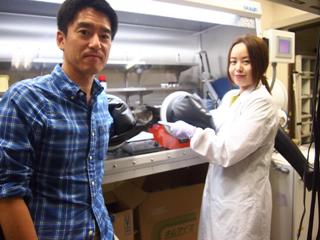Researchers from Hiroshima University have developed a Si quantum dot (QD)-based hybrid inorganic/organic light-emitting diode (LED) which exhibits white-blue electroluminescence.
 "Professor Ken-ichi Saitow, Natural Science Center for Basic Research and Development, Hiroshima University and Graduate student Yunzi Xin, Graduate School of Science, Hiroshima University, have fabricated an Si QD hybrid LED. (Credit:Natural Science Center for Basic Research and Development, Hiroshima University)"
"Professor Ken-ichi Saitow, Natural Science Center for Basic Research and Development, Hiroshima University and Graduate student Yunzi Xin, Graduate School of Science, Hiroshima University, have fabricated an Si QD hybrid LED. (Credit:Natural Science Center for Basic Research and Development, Hiroshima University)"
Professor Ken-ichi Saitow from Natural Science Center for Basic Research and Development at Hiroshima University and graduate student Yunzi XIN from Graduate School of Science at Hiroshima University, carried out this work in conjunction with their research partners.
It is hoped that a hybrid LED will be a next-generation illumination device capable of producing flexible lighting and display. The Si QD-based white-blue LED accomplishes this challenge.
The researchers developed the Si QD hybrid LED using a simple technique. The processes involved were all solution-based and performed at ambient temperature and pressure. A colloidal Si QD solution and conductive polymer solutions were deposited on a glass substrate.
The optical and the current power density of the LED are respectively 280 and 350 times greater than those formerly recorded for a similar device at the same voltage (6V). In addition, the LED’s active area is 4mm2, which is 40 times larger than that of a basic commercial LED, which has a thickness of 0.5mm.
QD LED has attracted significant attention as a next-generation LED. Although several breakthroughs will be required for achieving implementation, a QD-based hybrid LED allows us to give so fruitful feature that we cannot imagine.
Professor Ken-ichi Saitow, Hiroshima University
This research has been published in a paper entitled 'White-blue electroluminescence from a Si quantum dot hybrid light-emitting diode' in the journal Applied Physics Letters.